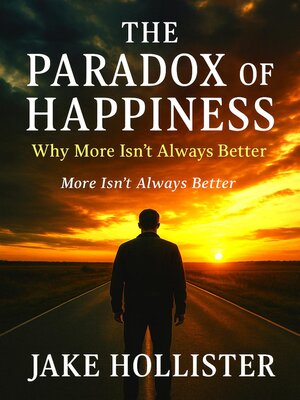
Sign up to save your library
With an OverDrive account, you can save your favorite libraries for at-a-glance information about availability. Find out more about OverDrive accounts.
Find this title in Libby, the library reading app by OverDrive.



Search for a digital library with this title
Title found at these libraries:
| Library Name | Distance |
|---|---|
| Loading... |
What if the very pursuit of happiness is making us unhappy? In The Paradox of Happiness: Why More Isn't Always Better, this groundbreaking book unravels the complex relationship between our cultural obsession with positive thinking and the unintended consequences it often brings — emotional repression, anxiety, and a sense of emptiness.
Drawing on insights from psychology, philosophy, and neuroscience, this book explores the hedonic treadmill and how constant striving for more joy can leave us feeling stuck and dissatisfied. It challenges the myths propagated by the happiness industry and the pressure to maintain an artificially upbeat facade, revealing the hidden dangers of toxic positivity.
More than just a critique, The Paradox of Happiness offers practical tools to cultivate emotional intelligence, self-compassion, and mindfulness — essential skills for embracing the full spectrum of human emotions, including sadness and vulnerability. By fostering psychological flexibility and emotional authenticity, readers can break free from the cycle of chasing fleeting pleasure and discover deeper meaning and fulfillment.
This book also examines cultural narratives that shape our understanding of happiness and success, urging us to reconsider what truly matters. It highlights the importance of relationships, purpose, and inner peace as pillars of genuine wellbeing, rather than external achievements or material gains.
Whether you're struggling with stress, burnout, or simply seeking a more balanced life, The Paradox of Happiness provides a compassionate guide to navigating the paradoxes of human emotion. It invites you to redefine happiness not as a destination but as a dynamic process of acceptance, growth, and harmony — ultimately leading to a more meaningful and satisfying life.







